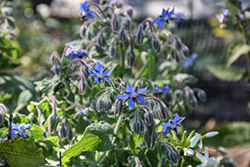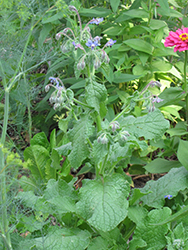Height: 3 feet
Spacing: 18 inches
Sunlight:
![]()
![]()
Hardiness Zone: (annual)
Other Names: Starflower
Description:
A sprawling annual that features open racemes of showy star shaped blue flowers in summer, above branched stems of crinkled, dull gray-green leaves that are edible, fresh or cooked; great for herb or wildflower gardens
Edible Qualities
Borage is an annual herb that is typically grown for its edible qualities, although it does have ornamental merits as well. The crinkled oval grayish green leaves can be harvested at any time in the season. The leaves have a mild taste with a crisp texture and a sweet fragrance.
The leaves are most often used in the following ways:
- Fresh Eating
- Cooking
Planting & Growing
Borage will grow to be about 3 feet tall at maturity, with a spread of 18 inches. When grown in masses or used as a bedding plant, individual plants should be spaced approximately 18 inches apart. This fast-growing annual will normally live for one full growing season, needing replacement the following year.
This plant is quite ornamental as well as edible, and is as much at home in a landscape or flower garden as it is in a designated herb garden. It does best in full sun to partial shade. It prefers dry to average moisture levels with very well-drained soil, and will often die in standing water. It is not particular as to soil type or pH. It is somewhat tolerant of urban pollution. This species is not originally from North America..
Borage is a good choice for the edible garden, but it is also well-suited for use in outdoor pots and containers. With its upright habit of growth, it is best suited for use as a 'thriller' in the 'spiller-thriller-filler' container combination; plant it near the center of the pot, surrounded by smaller plants and those that spill over the edges. It is even sizeable enough that it can be grown alone in a suitable container. Note that when growing plants in outdoor containers and baskets, they may require more frequent waterings than they would in the yard or garden.

